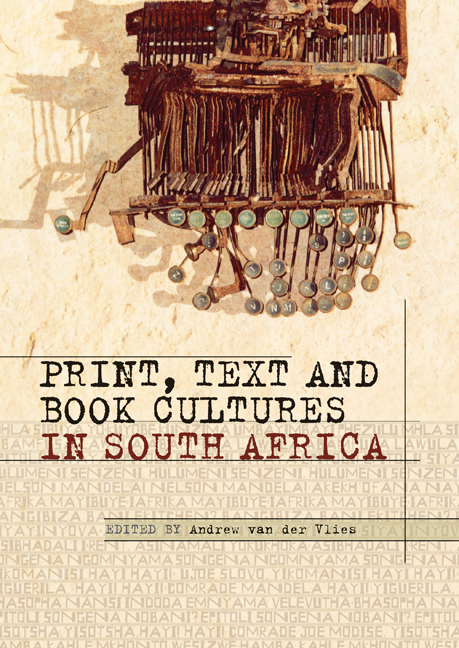Book contents
- Frontmatter
- Contents
- Acknowledgements
- Abbreviations and acronyms
- 1 Introductory
- 2 Print Cultures and Colonial Public Spheres
- 3 Local/Global: South African Writing and Global Imaginaries
- 4 Three Ways of Looking at Coetzee
- 5 Questions of the Archive and the Uses of Books
- 6 Orature, Image, Text
- 7 Ideological Exigencies and the Fates of Books
- 7.1 The Politics of Obscenity: Lady Chatterley's Lover and the Apartheid State
- 7.2 “Deeply Racist, Superior and Patronising”: South African Literature Education and the “Gordimer Incident”
- 7.3 Begging the Questions: Producing Shakespeare for Post-apartheid South African Schools
- 8 New Directions
- Contributors
- Index
7.2 “Deeply Racist, Superior and Patronising”: South African Literature Education and the “Gordimer Incident”
from 7 - Ideological Exigencies and the Fates of Books
Published online by Cambridge University Press: 21 April 2018
- Frontmatter
- Contents
- Acknowledgements
- Abbreviations and acronyms
- 1 Introductory
- 2 Print Cultures and Colonial Public Spheres
- 3 Local/Global: South African Writing and Global Imaginaries
- 4 Three Ways of Looking at Coetzee
- 5 Questions of the Archive and the Uses of Books
- 6 Orature, Image, Text
- 7 Ideological Exigencies and the Fates of Books
- 7.1 The Politics of Obscenity: Lady Chatterley's Lover and the Apartheid State
- 7.2 “Deeply Racist, Superior and Patronising”: South African Literature Education and the “Gordimer Incident”
- 7.3 Begging the Questions: Producing Shakespeare for Post-apartheid South African Schools
- 8 New Directions
- Contributors
- Index
Summary
On 15 April 2001 the South African Sunday Independent headlined: “Gordimer ‘too racist’ for schools” (Isaacson 2001). It reported on a selection process initiated by the Gauteng Department of Education (GDE) to compile a new list of literary setworks for South African secondary school learners in their final school year. In the days following 15 April, local and international newspapers picked up on the story too, greatly emphasising the fact that the novel July's People by Nobel Prize-winner, anti-apartheid activist and African National Congress (ANC) member Nadine Gordimer was described in the selection process's summary report as “deeply racist, superior and patronising”. Much fuss was made about the fact that other canonical texts did not escape unscathed from the selection process either. Shakespeare's Julius Caesar was described as a sexist play that “elevates men”. Hamlet was deemed unsuitable for classroom reading because the text is not “optimistic or uplifting”; furthermore, it would not appeal to learners, since “royalty is no longer fashionable”. Athol Fugard's play My Children, My Africa! was considered inappropriate as educational material, the newspapers recounted, because “learners in multicultural classrooms should not be subjected to literature which negatively reflects the sordid socio-economic past” (Pretorius 2001, quoting from the GDE's summary report). George Orwell's Nineteen Eighty-Four was evaluated negatively, too, because the text was held to contain “an element of subversive rebellion against the state, which is perhaps no longer relevant” (Forrest 2001, quoting from the GDE's summary report).
These comments, all taken from the summary report on the selection process compiled by the GDE, were cited repeatedly by local and international newspapers. This media intervention turned the report—and the process as a whole—into a sensational public event, characterised by many outraged, emotional comments on the selection process itself, the state of education in South Africa, the function and role of literature in the “New” South Africa, and the position of the ANC government in these developments.
- Type
- Chapter
- Information
- Print, Text and Book Cultures in South Africa , pp. 369 - 385Publisher: Wits University PressPrint publication year: 2012



